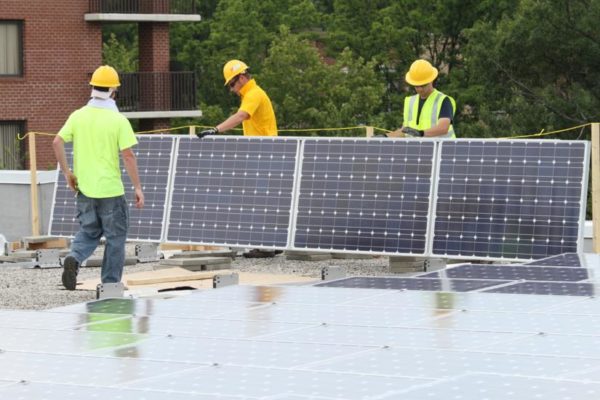Arlington is looking for public input on a plan to use energy more efficiently.
Tonight (June 4) from 7-9 p.m. at the Central Library Auditorium (1015 N Quincy Street), county staff plan to host an open house during which the community can ask questions or offer feedback on an update to the county’s Community Energy Plan (CEP).
Goals for the project include:
- Increase the energy and operational efficiency of all buildings: By 2050, the plan aims to have total building energy usage in Arlington be 38 percent lower than in 2007. In the report, staff says both code-required reductions for buildings and incentives for voluntary efficiencies — a carrot and stick approach — will be required.
- Ensure Arlington’s energy resilience: The report notes — and anyone in Ballston two weeks ago can confirm — Arlington’s energy infrastructure is vulnerable to extreme weather and other factors. The report says Arlington will need to use new technologies to rely on more local sources of energy and potentially establish “microgrids” to make critical pieces of infrastructure like Joint Base Myer-Henderson Hall and the Virginia Hospital Center more independent from blackouts across the county.
- Increase locally generated energy supply: The plan aims to have Arlington County follow the example of Discovery Elementary, which won accolades for using all its energy generated on-site, and establish more solar energy collectors and other green energy sites across Arlington.
- Move more people with fewer greenhouse gas emissions: The goal here is fairly self-explanatory, but the general idea is to get more Arlingtonians using buses, bicycles, and other non-car means of transportation, while encouraging those who are required to use cars to shift toward hybrid and energy-efficient vehicles.
- Integrate energy goals into all county government activities: The report says Arlington should aim at having government facilities reduce CO2 emissions to 71 percent below their 2007 levels by 2040. The approach would involve a mix of smaller efficiencies in energy and water usage and larger shifts in making new government facilities more energy efficient from a design standpoint.
- Support residents and businesses that reduce energy usage: The final goal of the report involves using county staff and resources to help encourage locals — from individuals to business owners — find ways to rethink energy usage in their own lives.
“We invite the community to drop in and spend as much time as needed to learn about the draft CEP update, CEP implementation details, and provide feedback on the proposed changes to the 2013 CEP,” Rich Dooley, Arlington’s community energy coordinator, said in an email.


